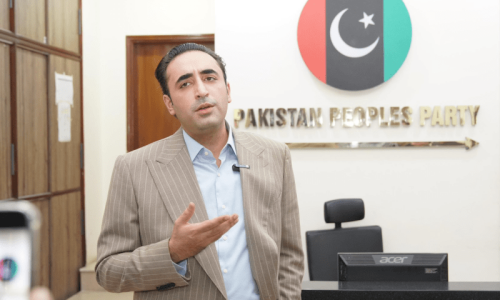ISLAMABAD, Feb 13: Like the previous government, the caretaker set-up also has failed to secure $30 billion foreign funding needed for five big dams and mass transit systems in Karachi, Lahore and Rawalpindi.
It is against this backdrop that the Ministry of Finance is holding an international conference in Islamabad from May 11 to 13 to invite foreign investors, including banks and multinational funding agencies, to take part in Pakistan’s infrastructure development projects.
Official circles believe that by May the newly elected government will be able to win back foreign investors’ confidence.
Mr Aijaz Ahmad, chief executive officer of the Infrastructure Project Development Facility (IPDF) of the Ministry of Finance, told Dawn on Wednesday that effort would be made at the conference to arrange about $20 billion funding for five major dams -- Kalabagh, Bahshah, Akhori, Munda and Kurrum Tangi.
“Then we need to raise about $10 billion for three mass transit projects in Karachi, Lahore and Islamabad, two shipyards, one in Karachi and the other in Gwadar, CNG bus project in Karachi and some projects in the horticulture sector. We also need funding for the Iran-Pakistan-India (IPI) gas pipeline which will be discussed at the conference,” he added.
A number of international law and advisory firms have also been invited.
Mr Ahmad said that Pakistan also needed foreign investment for new power projects. He expected that during the first year of the next government about $2 billion would be raised through foreign investment.
He said that power and telecom sectors had witnessed an increase in private investment in Pakistan. But it has been difficult to attract funding for infrastructure projects.
Mr Ahmad said that 44 infrastructure projects were in the pipeline of which 21 were on the active list while the rest were being developed.
“IPDF’s active project portfolio consists of 44 such projects worth $1.4 billion,” he said.
The IPDF chief expressed the hope that the recently approved public-private partnership policy would greatly enhance the confidence of top international players in the country’s infrastructure development projects.
Sources said that the growing fiscal constraints had forced the government to withdraw from its traditional role of financing PSDP projects by having an effective public-private partnership from the 2008-09 financial year.
Initially, it was proposed to cut 50 per cent government funding in the PSDP and the gap will be filled by the private sector. The World Bank and Asian Development Bank are believed to have approved the proposal in principle and indicated that they would be willing to provide necessary support for improving and expanding infrastructure services for public-private partnership in Pakistan.
The Planning Commission, the IPDF and the two international donors are in touch with leading investors to have the next PSDP shared by public and private sectors on a 50:50 basis.
However, the private sector maintains that the government should first come up with a regulatory framework for the public-private partnership on a sustained basis for a longer period.
A draft law and the regulatory framework are being prepared and expected to be finalised soon.













































Dear visitor, the comments section is undergoing an overhaul and will return soon.